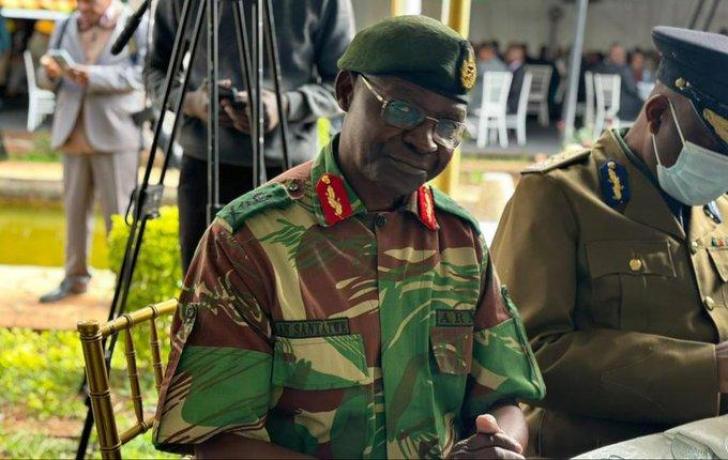News / National
Military cog undermining democracy in Zimbabwe
11 Sep 2024 at 18:58hrs | Views

A recent report from the Zimbabwe Democracy Institute (ZDI) highlights the growing influence of the Zimbabwean military in undermining democratic processes and manipulating the country's electoral system. The report, titled "Who is the Elephant in the Room? The Warrior Tradition, the Military, and the Party," sheds light on how the military's control over key institutions, such as the Zimbabwe Electoral Commission (ZEC), and its impact on Zanu-PF's internal politics are threatening the integrity of Zimbabwe's democracy.
Military's Role in Politics
The report references controversial remarks made by Zimbabwe National Army (ZNA) Commander Lieutenant-General Anselem Nhamo Sanyatwe, who recently vowed at a Zanu-PF event in Nyanga North to suppress opposition forces and ensure Zanu-PF's indefinite rule. In a recorded video, Sanyatwe declared, "Zanu-PF will rule forever… whether you like it or not," and promised to use "command voting" to maintain party control.
Historical Context and Concerns
According to the ZDI report, such statements reflect a long-standing trend in Zimbabwe's political history, reminiscent of past military interventions. The report draws parallels to the 1975 Mgagao Declaration, which led to Robert Mugabe's rise to Zanu leadership, underscoring the military's historical role in shaping political transitions.
The ZDI report stresses that the military's control over Zanu-PF and its strategic patronage networks across state institutions, including the legislature, judiciary, and electoral bodies, poses a significant challenge to democratic processes. It notes that the military's influence has been crucial in maintaining Zanu-PF's dominance and obstructing potential challenges from opposition parties.
Impact on Governance and Trust
The report argues that the military's involvement in politics, particularly in controlling Zanu-PF, is a key factor in Zimbabwe's political dynamics. It points out that the deep-seated patronage networks within Zanu-PF make it extremely difficult for any president outside the party to govern effectively.
The ZDI also highlights the erosion of public trust due to the military's disproportionate control and influence. The report calls for a re-examination of the role of the military in public affairs and urges citizens to engage in discussions on how to rebuild legitimacy and trust in governance. It emphasizes that trust is essential for a thriving political system and cannot be enforced by coercion.
Call for Democratic Reforms
In light of the report's findings, the ZDI advocates for a transparent and inclusive approach to political transitions. It argues that the military's role must be addressed to ensure meaningful citizen participation and to restore confidence in Zimbabwe's democratic institutions.
The report concludes with a call to address the "elephant in the room"—the pervasive influence of the military in political and electoral processes. It underscores the need for open discussions on these complex dynamics to chart a path forward for Zimbabwe's democracy and governance.
By addressing these issues, the report aims to unravel the intricacies of Zimbabwe's political landscape and the military's influential role in shaping the country's future.
Military's Role in Politics
The report references controversial remarks made by Zimbabwe National Army (ZNA) Commander Lieutenant-General Anselem Nhamo Sanyatwe, who recently vowed at a Zanu-PF event in Nyanga North to suppress opposition forces and ensure Zanu-PF's indefinite rule. In a recorded video, Sanyatwe declared, "Zanu-PF will rule forever… whether you like it or not," and promised to use "command voting" to maintain party control.
Historical Context and Concerns
According to the ZDI report, such statements reflect a long-standing trend in Zimbabwe's political history, reminiscent of past military interventions. The report draws parallels to the 1975 Mgagao Declaration, which led to Robert Mugabe's rise to Zanu leadership, underscoring the military's historical role in shaping political transitions.
The ZDI report stresses that the military's control over Zanu-PF and its strategic patronage networks across state institutions, including the legislature, judiciary, and electoral bodies, poses a significant challenge to democratic processes. It notes that the military's influence has been crucial in maintaining Zanu-PF's dominance and obstructing potential challenges from opposition parties.
Impact on Governance and Trust
The report argues that the military's involvement in politics, particularly in controlling Zanu-PF, is a key factor in Zimbabwe's political dynamics. It points out that the deep-seated patronage networks within Zanu-PF make it extremely difficult for any president outside the party to govern effectively.
The ZDI also highlights the erosion of public trust due to the military's disproportionate control and influence. The report calls for a re-examination of the role of the military in public affairs and urges citizens to engage in discussions on how to rebuild legitimacy and trust in governance. It emphasizes that trust is essential for a thriving political system and cannot be enforced by coercion.
Call for Democratic Reforms
In light of the report's findings, the ZDI advocates for a transparent and inclusive approach to political transitions. It argues that the military's role must be addressed to ensure meaningful citizen participation and to restore confidence in Zimbabwe's democratic institutions.
The report concludes with a call to address the "elephant in the room"—the pervasive influence of the military in political and electoral processes. It underscores the need for open discussions on these complex dynamics to chart a path forward for Zimbabwe's democracy and governance.
By addressing these issues, the report aims to unravel the intricacies of Zimbabwe's political landscape and the military's influential role in shaping the country's future.
Source - newshawks










































